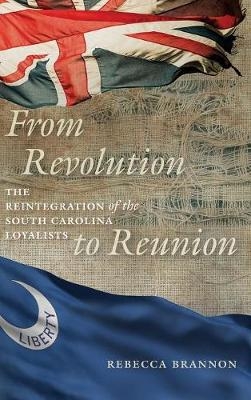
From Revolution to Reunion
The Reintegration of the South Carolina Loyalists
Seiten
2016
University of South Carolina Press (Verlag)
978-1-61117-668-1 (ISBN)
University of South Carolina Press (Verlag)
978-1-61117-668-1 (ISBN)
The American Revolution was a vicious civil war fought between families and neighbors. Nowhere was this truer than in South Carolina. From Revolution to Reunion investigates the way in which South Carolinians managed to reconcile their bitter differences and reunite to heal South Carolina and create a stable foundation for the new United States to become a political and economic leader.
The American Revolution was a vicious civil war fought between families and neighbors. Nowhere was this truer than in South Carolina. Yet, after the Revolution, South Carolina’s victorious Patriots offered vanquished Loyalists a prompt and generous legal and social reintegration. From Revolution to Reunion investigates the way in which South Carolinians, Patriot and Loyalist, managed to reconcile their bitter differences and reunite to heal South Carolina and create a stable foundation for the new United States to become a political and economic leader.
Rebecca Brannon considers rituals and emotions, as well as historical memory, to produce a complex and nuanced interpretation of the reconciliation process in post-Revolutionary South Carolina, detailing how Loyalists and Patriots worked together to heal their society. She frames the process in a larger historical context by comparing South Carolina’s experience with that of other states.
Brannon highlights how Loyalists apologized but also went out of their way to serve their neighbors and to make themselves useful, even vital, members of the new experiment in self-government and liberty ushered in by the Revolution. Loyalists built on existing social ties to establish themselves in the new Republic, and they did it successfully.
By 1784 the state government reinstated almost all the Loyalists who had stayed, as the majority of Loyalists had reinscribed themselves into the postwar nation. Brannon argues that South Carolinians went on to manipulate the way they talked about Loyalism in public to guarantee that memories would not be allowed to disturb the peaceful reconciliation they had created. South Carolinians succeeded in creating a generous and lasting reconciliation between former enemies, but in the process they unfortunately downplayed the dangers of civil war—which may have made it easier for South Carolinians to choose another civil war.
The American Revolution was a vicious civil war fought between families and neighbors. Nowhere was this truer than in South Carolina. Yet, after the Revolution, South Carolina’s victorious Patriots offered vanquished Loyalists a prompt and generous legal and social reintegration. From Revolution to Reunion investigates the way in which South Carolinians, Patriot and Loyalist, managed to reconcile their bitter differences and reunite to heal South Carolina and create a stable foundation for the new United States to become a political and economic leader.
Rebecca Brannon considers rituals and emotions, as well as historical memory, to produce a complex and nuanced interpretation of the reconciliation process in post-Revolutionary South Carolina, detailing how Loyalists and Patriots worked together to heal their society. She frames the process in a larger historical context by comparing South Carolina’s experience with that of other states.
Brannon highlights how Loyalists apologized but also went out of their way to serve their neighbors and to make themselves useful, even vital, members of the new experiment in self-government and liberty ushered in by the Revolution. Loyalists built on existing social ties to establish themselves in the new Republic, and they did it successfully.
By 1784 the state government reinstated almost all the Loyalists who had stayed, as the majority of Loyalists had reinscribed themselves into the postwar nation. Brannon argues that South Carolinians went on to manipulate the way they talked about Loyalism in public to guarantee that memories would not be allowed to disturb the peaceful reconciliation they had created. South Carolinians succeeded in creating a generous and lasting reconciliation between former enemies, but in the process they unfortunately downplayed the dangers of civil war—which may have made it easier for South Carolinians to choose another civil war.
Rebecca Brannon is an assistant professor of history at James Madison University, USA. Brannon graduated magna cum laude from Amherst College and earned her Ph.D. at the University of Michigan. She lives with her spouse and son in the beautiful Shenandoah Valley.
| Erscheinungsdatum | 12.09.2016 |
|---|---|
| Verlagsort | South Carolina |
| Sprache | englisch |
| Maße | 152 x 228 mm |
| Gewicht | 498 g |
| Themenwelt | Sachbuch/Ratgeber ► Geschichte / Politik ► Allgemeines / Lexika |
| Geschichte ► Allgemeine Geschichte ► Neuzeit (bis 1918) | |
| Geisteswissenschaften ► Geschichte ► Regional- / Ländergeschichte | |
| Geschichte ► Teilgebiete der Geschichte ► Militärgeschichte | |
| ISBN-10 | 1-61117-668-9 / 1611176689 |
| ISBN-13 | 978-1-61117-668-1 / 9781611176681 |
| Zustand | Neuware |
| Haben Sie eine Frage zum Produkt? |
Mehr entdecken
aus dem Bereich
aus dem Bereich
Europa 1848/49 und der Kampf für eine neue Welt
Buch | Hardcover (2023)
DVA (Verlag)
CHF 67,20
Giordano Bruno - ein ketzerisches Leben
Buch | Hardcover (2024)
C.H.Beck (Verlag)
CHF 41,85


